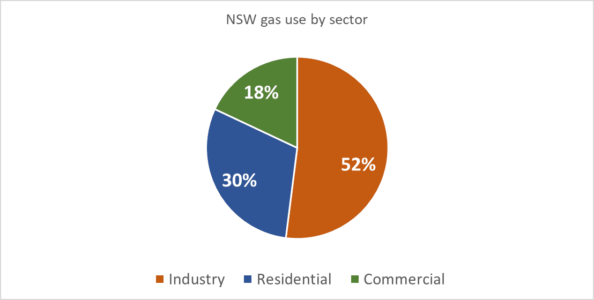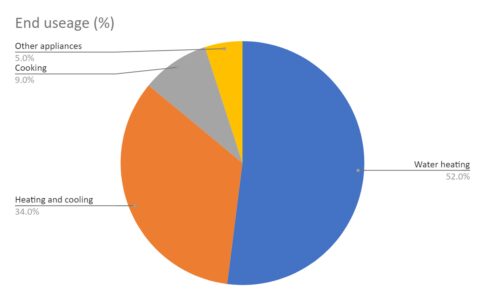Why is 350 working only with councils in NSW and not other councils?
NSW councils have the power to change their planning laws to ensure that new developments are all-electric without gas. There’s a growing movement led by NSW councils to create all-electric, gas-free homes and businesses. 350 has decided to join this movement by working with councils and local communities in NSW as part of a broader push to ensure the NSW state government takes the action needed to get off gas.
Terminology
Electrify Your Council is asking councils to ensure that all new homes and businesses are all-electric and gas-free. We use the term ‘homes’ to describe residential buildings as defined under the NSW planning scheme, and the term ‘businesses’ to refer to commercial buildings as defined under the scheme. While industrial buildings are usually businesses, we’ve chosen to use the term ‘businesses’ to refer only to commercial buildings. This campaign is not calling for councils to require all-electric, gas-free industrial buildings at this stage.
Under the NSW planning scheme, ‘residential buildings’ refers to all types of homes, including houses, townhouses and apartments. ‘Commercial buildings’ refers to:
- Retail and wholesale trade buildings
- Transport buildings
- Offices
- Education buildings (schools, kindergartens, daycare centres etc)
- Religious buildings
- Aged care facilities (including nursing homes)
- Health facilities like hospitals and medical clinics
- Entertainment and recreation buildings like cinemas and sporting facilities
- Short term accommodation buildings
- Non-residential buildings (excludes industrial buildings)
Is this campaign related to existing homes and businesses?
No. While we fully support electrifying and improving the energy efficiency of existing buildings, this campaign is focussed on new buildings only. Upgrading existing homes and businesses with electric appliances and energy efficiency improvements would require a highly coordinated, multi-billion dollar investment which is well-beyond the scope of local government. A comprehensive retrofit program for NSW homes and businesses is a state and federal government responsibility. This campaign focuses on encouraging local councils to do what they can within their existing powers and budgets. Councils changing their planning rules to ensure new developments are all-electric without gas is a relatively low-cost, regulatory change.
How much gas does NSW use?
Figure 1: NSW gas consumption by sector

Source: Tidemann, C., Rayner, J., and Cheung, H., Switch and Save: how gas is costing households, Climate Council 2022.
Figure 1 shows that the residential and commercial sectors in NSW account for just under half (48%) of the state’s total gas consumption, representing a major opportunity to reduce emissions from gas in homes and businesses.
Figure 2: Gas use in residential buildings
Figure 2 shows water heating is the number one user of gas in NSW homes, accounting for 52% of the state’s residential gas use, followed by heating/cooling (34%), and cooking (9%). That’s why Electrify Your Council calls on councils to ensure that new homes be required to install electric rather than gas hot water units.
Gas use in commercial buildings
Gas use in the commercial building stock is not well documented in national statistics. Current, reputable data suggests that around 40,546 commercial buildings in NSW use gas, or 13.8% of all commercial buildings in the state. This represents another major opportunity for emissions reduction in NSW.
How can we get gas out of new homes and businesses?
The development of heat pump technology has fundamentally changed how we power our homes and buildings. Heat pumps have changed the game because they’re a versatile technology that can be used for a variety of uses in the home and in commercial settings. Here’s a quick summary of how homes and businesses can get off gas by incorporating heat pumps.
Heat pumps in the home
Heat pump technology can be used in the home to heat and cool space using reverse cycle air conditioners (RCACs). Reverse-cycle air conditioning is 300% to 600% efficient, which means that it can take one unit of electrical energy and turn it into 3 to 6 units of heating energy. By contrast, gas appliances generally use around one unit of energy and convert it to one unit of heat, making RCACs up to five times more efficient than gas appliances. Heat pumps are also the superior choice for heating water in terms of energy efficiency – an electric heat pump hot water unit uses around 75% less energy than a gas hot water unit.
When it comes to cooking, gas appliances are by far the most inefficient. Electric induction cooktops operate at around 85% efficiency, meaning that 85% of the energy is used to heat your food, with only 15% wasted. Gas stoves by comparison are around 30% efficient, meaning that 70% of the energy is wasted as it ends up in the room, not within the cooking pot.
Heat pumps in commercial buildings
Heat pumps can be used for a wide range of purposes across a wide range of commercial uses. Largely due to the availability of heat pumps, the technology now exists to fully electrify commercial buildings, which includes schools, hospitals, cafes, restaurants, offices and other retail outlets. Many commercial activities, like heating large boilers to manufacture products, or heating/cooling large warehouses to store food and other goods, can be done using electric appliances, particularly heat pumps.
Even chefs, who have traditionally favoured gas cooktops for commercial kitchens, are making the switch to electric, induction cooktops due to their superior cooking technology without the toxic pollution from gas cooktops. The Global Cooksafe Coalition, whose supporters include celebrity chefs Neil Perry and Melissa Leong, actress Julia Roberts, health advocates Asthma Australia, plus major property developers including Lendlease, are calling for gas cooktops to be phased out from commercial kitchens and replaced with superior electric induction cooktops.
Due to the availability of heat pumps, there’s no longer any technological barrier to transitioning our homes and businesses away from gas.

